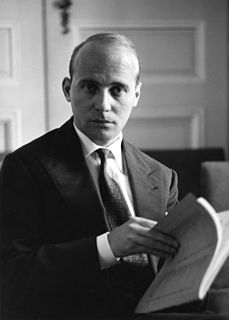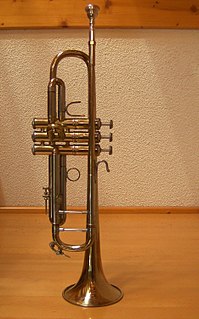Related Research Articles

A musical ensemble, also known as a music group or musical group, is a group of people who perform instrumental or vocal music, with the ensemble typically known by a distinct name. Some music ensembles consist solely of instrumentalists, such as the jazz quartet or the orchestra. Other music ensembles consist solely of singers, such as choirs and doo wop groups. In both popular music and classical music, there are ensembles in which both instrumentalists and singers perform, such as the rock band or the Baroque chamber group for basso continuo and one or more singers. In classical music, trios or quartets either blend the sounds of musical instrument families or group together instruments from the same instrument family, such as string ensembles or wind ensembles. Some ensembles blend the sounds of a variety of instrument families, such as the orchestra, which uses a string section, brass instruments, woodwinds and percussion instruments, or the concert band, which uses brass, woodwinds and percussion.
Mark-Anthony Turnage CBE is an English composer of classical music.
Chen Yi is a Chinese-American violinist and composer of contemporary classical music. She was the first Chinese woman to receive a Master of Arts (M.A.) in music composition from the Central Conservatory of Music in Beijing. Chen was a finalist for the 2006 Pulitzer Prize for Music for her composition Si Ji, and has received awards from the Koussevistky Music Foundation and American Academy of Arts and Letters, as well as fellowships from the Guggenheim Foundation and the National Endowment for the Arts. In 2010, she was awarded an Honorary Doctorate from The New School and in 2012, she was awarded the Brock Commission from the American Choral Directors Association. She was elected to the American Academy of Arts and Letters in 2019.
Anthony Gilbert is a British composer and academic, long associated with the Royal Northern College of Music.

Gershwin's World is a studio album by the American jazz pianist Herbie Hancock. Prominent guests include Joni Mitchell, Kathleen Battle, Stevie Wonder, Wayne Shorter and Chick Corea.
John Mackey is an American composer of contemporary classical music, with an emphasis on music for wind band, as well as orchestra. For several years, he focused on music for modern dance and ballet.

Hans Werner Henze composed the nine Sacred Concertos that comprise his Requiem over the course of three years from 1991 to 1993 on commissions from the London Sinfonietta, Suntory Corporation for the NHK Philharmonic, and Westdeutscher Rundfunk, Cologne. The first movement, Introitus: Requiem Aeternam was commissioned by the London Sinfonietta as part of a memorial concert for Artistic Director Michael Vyner who died on 20 October 1989. In addition to Henze, the London Sinfonietta also commissioned seven other prominent composers to write works in Vyner's memory to make up the program which was performed on the 6 May 1990.
Symphony in B-flat for Band was written by the German composer Paul Hindemith in 1951. It was premiered on April 5 of that year by the U.S. Army Band "Pershing's Own" with the composer conducting.
David Frederick Stock was an American composer and conductor.

The trumpet repertoire consists of solo literature and orchestral or, more commonly, band parts written for the trumpet. Tracings its origins to 1500 BC, the trumpet is a musical instrument with the highest register in the brass family.
Erich Urbanner is an Austrian composer and teacher.
Greek is an opera in two acts composed by Mark-Anthony Turnage to a libretto adapted by Turnage and Jonathan Moore from Steven Berkoff's 1980 verse play Greek. The play and the opera are a re-telling of Sophocles's Greek tragedy Oedipus Rex with the setting changed to the East End of London in the 1980s. The opera was first performed on 17 June 1988 in the Carl-Orff-Saal of the Gasteig, Munich, in a co-production by the Munich Biennale, the Edinburgh International Festival and the BBC.

Tigran Yeghiayi Mansurian is a leading Armenian composer of classical music and film scores, People's Artist of the Armenian SSR (1990), and honored art worker of the Armenian SSR (1984). He is the author of orchestral, chamber, choir and vocal works, which have been played across the world. He was nominated for Grammy awards in 2004 and 2017.

Stephen Goss is a Welsh composer, guitarist and academic. His compositional output includes orchestral and choral works, chamber music, and solo pieces. His music draws freely on a number of styles and genres. He is particularly known for his guitar music, which is widely performed and recorded.
The Concerto for Piano and Orchestra is a musical composition by the American composer Aaron Copland. The work was commissioned by the conductor Serge Koussevitzky who was then music director of the Boston Symphony Orchestra. It was first performed on January 28, 1927, by the Boston Symphony Orchestra conducted by Koussevitzky with the composer himself as the soloist. The piece is dedicated to Copland's patron Alma Morgenthau Wertheim.

The Triumph of Time, sometimes also referred to as Triumph of Time, is a composition for orchestra by British composer Harrison Birtwistle written 1971 and 1972. It is one of Birtwistle's best-known compositions, as well as one of the works that earned him international reputation.
Night Dances is one of the first compositions for orchestra written by British composer Mark-Anthony Turnage. It was written in 1981 and was awarded the Guinness Prize for composition that year.
Dispelling the Fears is a double concerto for two trumpets and orchestra by the British composer Mark-Anthony Turnage. It was composed in 1993 and 1994.
References
- 1 2 3 4 Simeone, Nigel (2015). Liner Notes of Decca 478 8356. Baarn: Decca.
- ↑ Buning, Marius; Engelberts, Matthijs; Houppermans, Sjef; Jacquart, Emmanuel C. (1997). Samuel Beckett l'œvre carrefour/l'œuvre limite. Rodopi. ISBN 978-90-420-0347-7 . Retrieved 10 June 2020.
- ↑ Laws, Catherine (2013). Headaches Among the Overtones: Music in Beckett / Beckett in Music. Rodopi. ISBN 978-94-012-1027-0 . Retrieved 10 June 2020.
- ↑ The Rough Guide to Classical Music. Rough Guides UK. 2010. ISBN 978-1-84836-677-0 . Retrieved 10 June 2020.
- ↑ Clark, Duncan (2001). Classical Music: The Rough Guide. Rough Guides. ISBN 978-1-85828-721-8 . Retrieved 10 June 2020.
- 1 2 3 Turnage, Mark-Anthony (1995). Your Rockaby, for soprano saxophone and orchestra. London: Schott. p. 81. Retrieved 10 June 2020.
- ↑ "Your Rockaby, mini concerto for... | Recording Details and Tracks". AllMusic. Retrieved 11 June 2020.